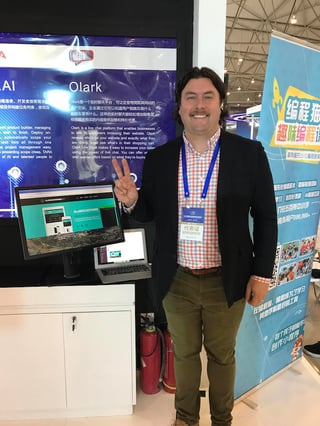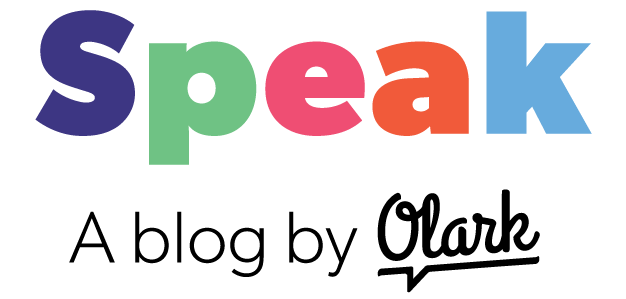
All Hands Support is our way of getting everyone on the team to contribute to customer support. It means that every week, every team member, even me, the PR guy, logs on for a three hour customer support shift.
Sometimes it's easy - a few questions about pricing or automated chat rules. Sometimes it means handling customer complaints effectively - using what I know about customer relations to ensure that a frustrated customer gets the help they need.
I realize that might seem a little crazy - for Olark and for me - to hand over the ‘keys to the car’ for three hours, but in reality it’s invaluable, for both of us.
When I was working with an independent PR agency, one of my first clients really brought us into their fold. We were invited into sales seminars and onto the tradeshow floor to meet with customers and resellers, and it was one of the most successful professional relationships I’ve had doing PR. Through those interactions, I learned about the company’s products through the eyes and minds of their customers.
Times for me have changed a little. Working for a digital company like Olark means I’m not attending hardware trade shows every quarter. And we don’t have a huge sales department to tag along with and learn from. So customer support has become the best channel to get those same direct customer conversations.
These interactions with existing and potential customers continue to make me a better communications professional, and here’s why.
It Helps Me Understand the Product
Every customer support shift is a test of how well I know our product. It forces me to study our product manual, and to think critically to help solve problems. It’s one thing to know that, yes, we have “Targeted Chat rules.” It’s another know how to create a rule so a chat box fires after a visitor has been on a site for 60 seconds and then automatically disappears if they don’t respond. And no two shifts are the same. If I answer a few questions about installation this week, I may have a whole new set of questions about mobile next week.
I Understand the Product from the Customer’s Viewpoint
Taking time out of my week to talk to customers reminds me what’s most important to them in the field. On a support shift in between meetings about an upcoming launch, I might talk to a teacher using chat for virtual office hours, or a customer using co-browsing to close sales, or a business creating operator groups for sales, general support and a specific product category. All of this helps me better see the range of benefits, realize new benefits we hadn’t considered, and ultimately go on to share that feedback with a reporter.
I Get a Well-Rounded POV
 As a flack, I’m tasked with being an advocate and opposition at the same time. Being an advocate is easy. Looking at our platform with a critical eye takes a little work. It involves getting objective feedback about our product’s shortcomings, regardless of whether they’re real or perceived. Through customer support, I can get immediate access to customers’ objective opinions. Sure, they’re quick to talk about the good things, but they’re also not shy about talking about what could be better. This feedback makes for better SWOT analyses, and makes it easier to frame our product using real-world anecdotes. It makes me a more objective resource.
As a flack, I’m tasked with being an advocate and opposition at the same time. Being an advocate is easy. Looking at our platform with a critical eye takes a little work. It involves getting objective feedback about our product’s shortcomings, regardless of whether they’re real or perceived. Through customer support, I can get immediate access to customers’ objective opinions. Sure, they’re quick to talk about the good things, but they’re also not shy about talking about what could be better. This feedback makes for better SWOT analyses, and makes it easier to frame our product using real-world anecdotes. It makes me a more objective resource.
I Constantly Uncover New Case Studies
Every customer conversation is an opportunity to find a new way in which the product is being used. So while a customer might initiate a conversation about a particular feature, I try not to let the conversation end without asking them how they use the product. Customers are always willing to talk more about how they use our product. I’ve found some really cool example customers that brighten up conversations with media.
I’m an Integral Part of the Team
Finally, let’s just be honest. The common knock against PR pros might be that we only know ‘just enough.’ I hate feeling like an outsider, or that I’m not pulling my own weight. Spending time helping customers forces me to go outside of my comfort zone and in the process help our CS team and our customers. It also empowers me to make more meaningful contributions during team product conversations.
This might all sound great in theory, but as a PR person, especially an in-house flack, it can be easy to get lulled to sleep thinking you know everything. Just because you’ve read all the marketing materials, or because you’re actually in the marketing department, doesn’t mean you won’t learn anything new from your customers.
Step up, lead by example and try your hand at customer support. Don’t wait for your client or your company to offer this opportunity. Be proactive and find a way to get involved with customer support. If you work for an agency, “ride along” on a customer support shift. If you’re in-house, dedicate some time to customer support. We do it weekly here, which might sound extreme, but find the time to do it. You’ll be glad you did.

